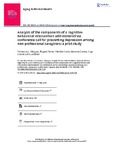Analysis of the Components of a Cognitive-Behavioral Intervention Administered Via Conference Call for Preventing Depression Among Non-Professional Caregivers: A Pilot Study

No accesible hasta 9999-99-99
Use este enlace para citar
http://hdl.handle.net/2183/35531Colecciones
- Investigación (FEDU) [938]
Metadatos
Mostrar el registro completo del ítemTítulo
Analysis of the Components of a Cognitive-Behavioral Intervention Administered Via Conference Call for Preventing Depression Among Non-Professional Caregivers: A Pilot StudyAutor(es)
Fecha
2017Cita bibliográfica
Fernando L. Vázquez, Ángela Torres, Patricia Otero, Vanessa Blanco, Olga Díaz & Luis E. Estévez (2017) Analysis of the components of a cognitive-behavioral intervention administered via conference call for preventing depression among nonprofessional caregivers: a pilot study, Aging & Mental Health, 21:9, 938-946, DOI: 10.1080/13607863.2016.1181714
Resumen
[Abstract] Objectives: The primary aim was to assess the feasibility/acceptability of a preventive cognitivebehavioral
intervention implemented via conference call for caregivers. The secondary aim was to
conduct a preliminary assessment of the efficacy of the behavioral activation component alone
compared to the complete cognitive-behavioral intervention.
Method: Sixty-one caregivers (mean age 58.4 years) were randomly assigned to a cognitive-behavioral
intervention via conference call (CBC, n D 20), a behavioral activation intervention via conference call
(BAC, n D 22) or a control group receiving usual care (CG, n D 19). Both interventions consisted of five
90-minute group sessions implemented weekly.
Results: Only 6.6% of caregivers discontinued the study. In the CBC and BAC groups, attendance and
satisfaction with the intervention were similarly high among both groups. Homework adherence was
also high in both groups. At post-treatment, there was a lower incidence of depression in the CBC and
BAC groups compared to the CG (0.0% for BAC and CBC vs. 10.5% for CG). The relative risk was 0.0,
and number needed to treat was 10 in both groups. Depressive symptoms were significantly reduced
in the CBC and BAC groups compared to the CG (d D 2.18 and d D 2.06).
Conclusion: The results support the feasibility of the intervention. Moreover, the BAC intervention was
non-inferior to the CBC intervention for reducing depressive symptoms
Palabras clave
Non-professional caregivers
Indicated prevention
Depression
Telephone
Pilot study
Indicated prevention
Depression
Telephone
Pilot study
Versión del editor
Derechos
© 2016 Informa UK Limited, trading as Taylor & Francis Group
ISSN
1360-7863





